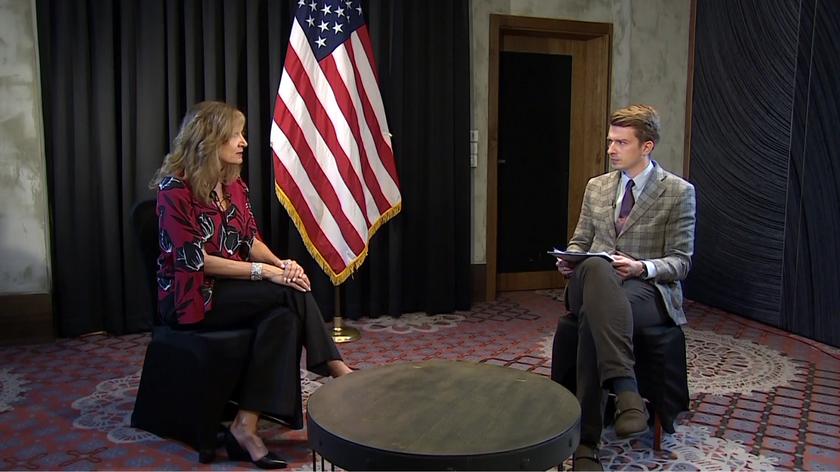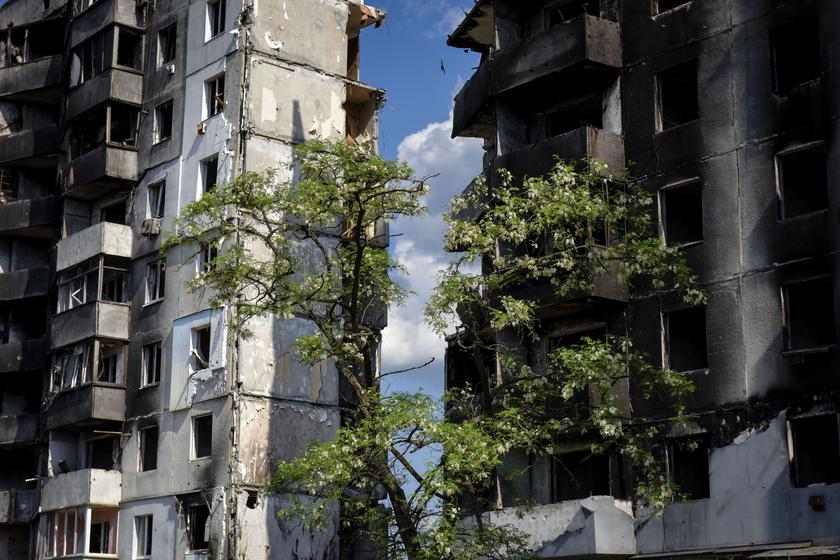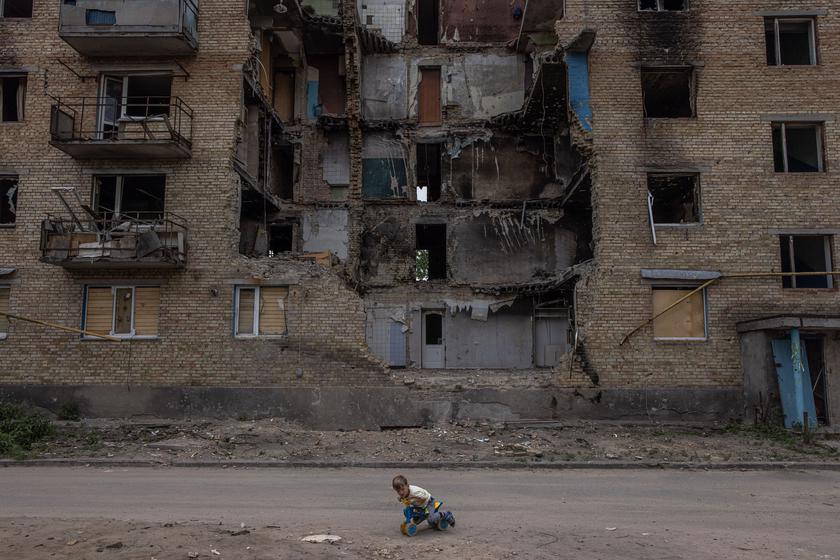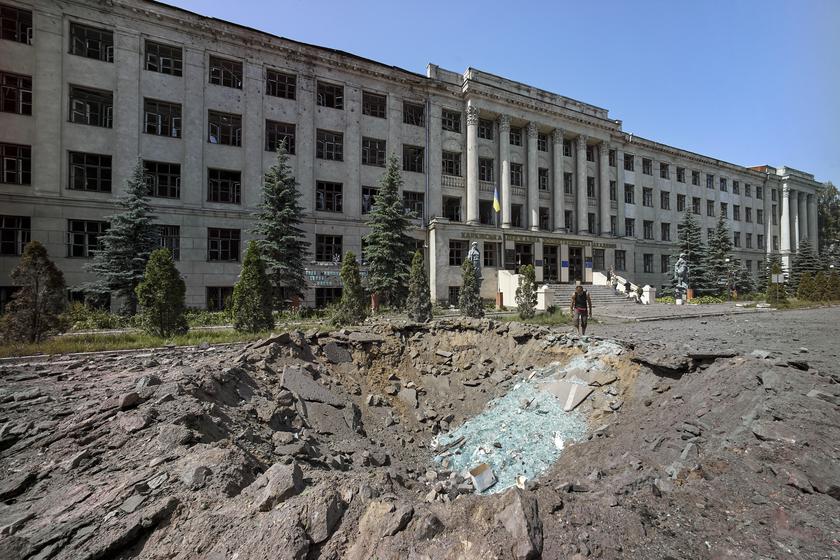Beth Van Schaack, US State Department’s Ambassador-at-Large for Global Criminal Justice, said in an interview for TVN24 how Russian war crimes perpetrators could be prosecuted. In her opinion, “the scale of what we saw in WWII is very similar to what we’re seeing now across the country of Ukraine”.
Dr. Beth Van Schaack was sworn in as the Department’s sixth Ambassador-at-Large for Global Criminal Justice (GCJ) on March 17, 2022. In this role, she advises the Secretary of State and other Department leadership on issues related to the prevention of and response to atrocity crimes, including war crimes, crimes against humanity, and genocide.
In her opinion, “there are multiple ways in which Russian forces and leaders could be held responsible for war crimes and other atrocities”.
“First, in the courts of Ukraine which have jurisdiction over any events that happen on Ukrainian territory. Second, the International Criminal Court has opened an investigation into potential war crimes by Russian forces and Ukrainian forces during the course of this armed conflict. And then finally other courts around the world that can exercise universal jurisdiction over the commission of international crimes, might be in the position to exercise the commission as well. Ukraine, “she explained.

Beth Van Schaack in an interview for TVN24 reporter Mateusz PółchłopekTVN24
“Another Nuremberg moment”
“This is absolutely another Nuremberg moment, for a number of reasons,” Van Schaack said. “Most importantly we see the international consensus that Russia has breached international norms. The invasion of Ukraine is a manifest violation of the UN Charter, we also have the commission of massive war crimes around the country, really anywhere the Russian forces are deployed. And so the scale of what we saw in WWII is very similar to what we’re seeing now across the country of Ukraine. We also have now the commission of a whole range of atrocities and we also saw that after WWII, “she told TVN24.
Asked if it was possible to hold Russian President Vladimir Putin accountable for the crimes committed, Van Schaack replied: “Anyone up the chain of command can be responsible under international law, so the direct perpetrator and then individuals who either issue orders or who have to command responsibility for individual perpetrators “. “All individuals up the chain of command can be held responsible. What really matters now is getting custody over the accused, and so that would be where the real challenge is when it comes to President Putin,” she added.
No prosecutions without evidence
“Most importantly, we need to continue to document the commission of international crimes across Ukraine, you cannot have successful prosecutions without evidence. And so gathering and authenticating evidence are extremely important,” the ambassador said when asked what must be done to prosecute those responsibly.
“The international community is working together with Ukrainian authorities to do that. Second, you need a court with jurisdiction. And we have that, we have that in the Ukrainian national courts, we have that in international courts around the world, and then of course the International Criminal Court which is exercising jurisdiction. The final challenge is this question of custody – so long as Russian perpetrators remain in Russia, it will be difficult to bring cases. Some courts can do what we call absentia trials, they can proceed without the presence of the accused, but many courts – including the International Criminal Court – require custody of the accused. So, the Russian leadership may remain safe from prosecution, if they remain in Russia, “she explained.
Asked exactly what kind of evidence would need to be secured, she said: “There are many, many sources of evidence, we see now increasingly digital evidence, evidence that collected by individual citizens just using their cellphone as a documentation mechanism”.

Bombed residential blocks in Borodyanka, Photo taken on June 9, 2022
PAP / EPA / OLEG PETRASYUK
“No statute of limitations for war crimes”
“We also have witness testimony – individuals who can speak to their own personal experience of what happened, what they saw, what happened to members of their family. We also have all sorts of satellite imagery that can track the movement of troops, the creation of mass graves, and leaving bodies by the side of the road – all of that can be documented and verified through satellite and other digital imagery. And then governments, of course, have intelligent sources, and these can be shared with prosecutors so that they have a collection of evidence that can be utilized in order to prove the commission of international crimes, “she added.
“Individuals who are involved in international criminal justice are playing a long game. We have to be patient and sometimes wait until an individual falls within the custody of a court with jurisdiction. But there is no statute of limitations for war crimes, and so even three, five, ten years later, individuals who are deemed responsible for these crimes can be prosecuted before courts of law, “ambassador Van Schaack said, referring to the trial of former Serbian President Slobodan Milosevic.

Damaged residential building in a town near Kiev/ ROMAN PILIPEY / PAP / EPA
16,000 potential war crimes documented
“It’s extremely dangerous to gather evidence,” she said when asked about the prosecutors’ work. “It’s still a live warzone and so individuals have to be extremely careful, and that’s why it’s so important we provide experts and type of equipment necessary to be able to travel around the country safely. The country is still under attack and that makes it difficult for prosecutors to do their work. In addition, we understand that some of Russia’s forces have left mines on the ground, around areas where crimes have been committed, and so that puts investigators at great risk. That said, these are professionals, this is what they do, Ukraine has a specialized war crime unit, they know what they’re doing.
Asked about the amount of evidence the prosecutors have managed to collect in Ukraine so far, the ambassador said: “My understanding is that they have documented something in the range of 16,000 potential individual incidents of war crimes. Not all of those will necessarily be able to to be prosecuted because you don’t have access to a defendant, or you don’t have access to the evidence that’s necessary “.

Destruction caused by Russian shelling in KharkivSERGEY KOZLOV / PAP / EPA
Joint investigative efforts
“The United States, the European Union, and the United Kingdom are all supporting a new project called the Atrocity Crimes Advisory Group. This project is providing strategic advice and mentorship to the prosecutor general and her prosecutors, in order to give them some guidance on how to prosecute war crimes, and what precedent exists. The Yugoslavia war crimes tribunal is a great example of where war crimes committed in the context of the warzone were investigated and prosecuted. Many veterans of that tribunal with the Atrocity Crimes Advisory Group to provide the assistance and strategic advice that might be necessary, “she said.
“The prosecutor general needs the independence to be able to do her work, but the international community is supporting this work through providing expert assistance,” Beth Van Schaack said when asked about cooperation between governments, courts, and other institutions.
“I know that our Department of Justice is also very interested in assisting on a prosecutor-to-prosecutor basis and those conversations are underway as well. The international community has also created a joint investigative team. This was initiated by Ukraine, Poland, and Lithuania, additional states have joined, and the United States and other EU states will also be participating, in order to assist this joint investigative team to share information among investigators and prosecutors in order to bring cases, “US State Department’s Ambassador-at-Large for Global Criminal Justice told TVN24.

